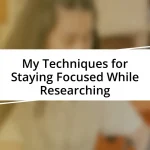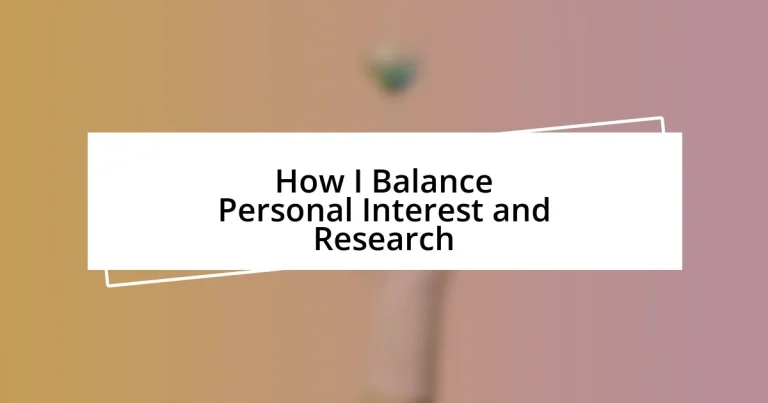Key takeaways:
- Recognizing and aligning personal interests with academic research can enhance motivation and creativity.
- Establishing a balanced schedule and incorporating downtime fosters greater inspiration and prevents burnout.
- Seeking feedback and collaboration from others can open new perspectives and enrich research ideas.
- Measuring success encompasses both emotional well-being and achievements in personal interests alongside research goals.
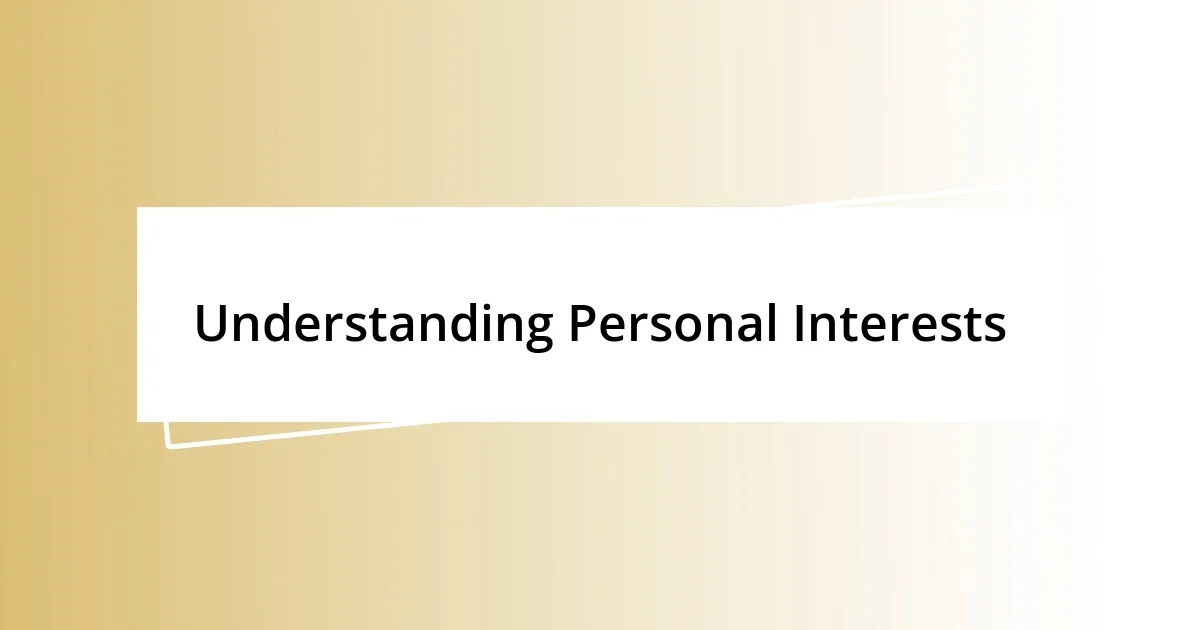
Understanding Personal Interests
Understanding our personal interests is like uncovering layers of ourselves that often lie beneath the surface. I remember the day I stumbled upon my passion for gardening. It wasn’t just about tending to plants; it was about nurturing growth—a reflection of my own journey. Have you ever felt that thrill when diving into something that resonates so deeply with who you are?
It’s fascinating to see how personal interests evolve over time. For years, I thought my love for photography was just a hobby, but it became a means of expression during times of stress. Isn’t it interesting how a simple activity can connect us to our emotions and experiences? This connection often leads us to rediscover parts of ourselves we might have overlooked.
Additionally, our interests can shape the way we interact with the world. I often find myself drawn to storytelling, whether through writing or conversation. It’s intriguing how sharing these passions can inspire others and create meaningful connections. Have you ever shared your interest and found it sparked a similar passion in someone else? It reminds us of the universal thread of humanity that ties us all together.
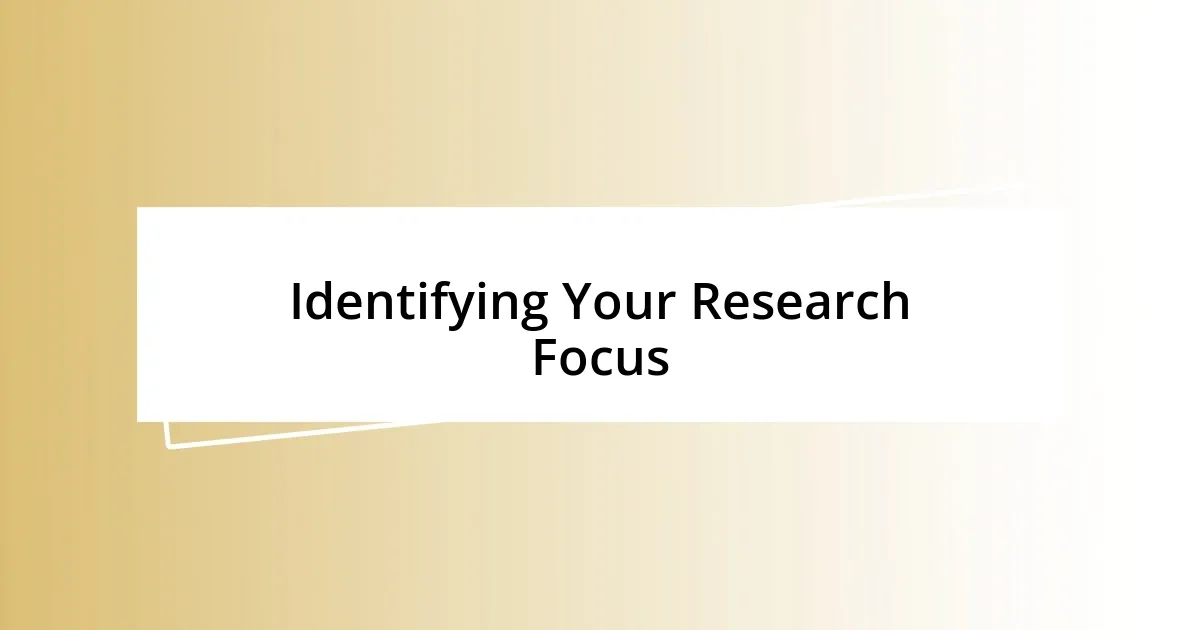
Identifying Your Research Focus
Identifying your research focus can be a transformative process. It’s essential to align your personal interests with broader research questions. I recall the moment I realized my fascination with environmental sustainability could serve as the foundation for my academic work. That realization not only intensified my passion but also gave my research direction—a blend of personal fervor with purpose.
As I navigated my academic journey, I learned that refining a research focus often requires introspection. I once spent weeks brainstorming ideas, only to find that the topics I was drawn to reflected my own values and experiences. Reflecting on what excites me helped me zero in on the themes that truly mattered. What about you? Have you considered how your personal beliefs might inform your academic inquiries?
To effectively identify your research focus, consider the intersection of your interests and existing gaps in knowledge. I believe this helps in crafting research that is both fulfilling and impactful. While exploring this intersection, I found that my background in psychology combined with my love for storytelling brought forth unique perspectives in my studies. Such a fusion can lead to groundbreaking discoveries—have you thought about how your experiences can shape your contributions to your field?
| Aspect | Personal Interest | Research Focus |
|---|---|---|
| Alignment | Passion-driven | Value-driven |
| Exploration | Through personal experiences | Through literature gaps |
| Impact | Inspires creativity | Addresses societal needs |
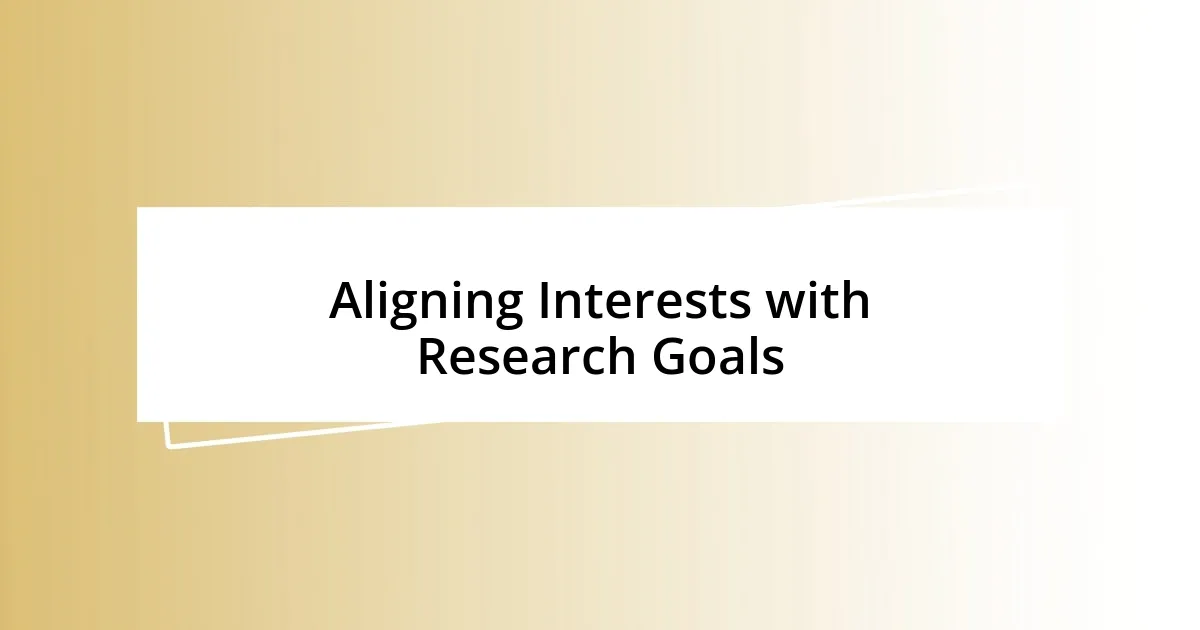
Aligning Interests with Research Goals
Aligning personal interests with research goals can create an exhilarating synergy that fuels motivation. I remember when I combined my love for travel with my fascination for cultural studies—this intersection opened doors to research on global migration patterns. It was remarkable to explore a topic that not only intrigued me personally but also had significant academic relevance. Have you ever felt that rush when you see your interests reflected in your work?
- Focusing on personal interests engages deeper emotional investment.
- Exploring themes related to passions often unveils unique research angles.
- Reflecting on experiences can highlight significant societal issues worth studying.
Finding a balance between what I enjoy and what I need to study has often been a dance of discovery. For example, my enthusiasm for cooking translated into an intriguing research project about food sustainability. I found that when I immersed myself in topics that sparked joy, the research process became not just a requirement but an adventure. Being deeply engaged allows me to bring authenticity to my work while contributing meaningfully to my field. Can you recall a moment when you felt fully connected to your research?
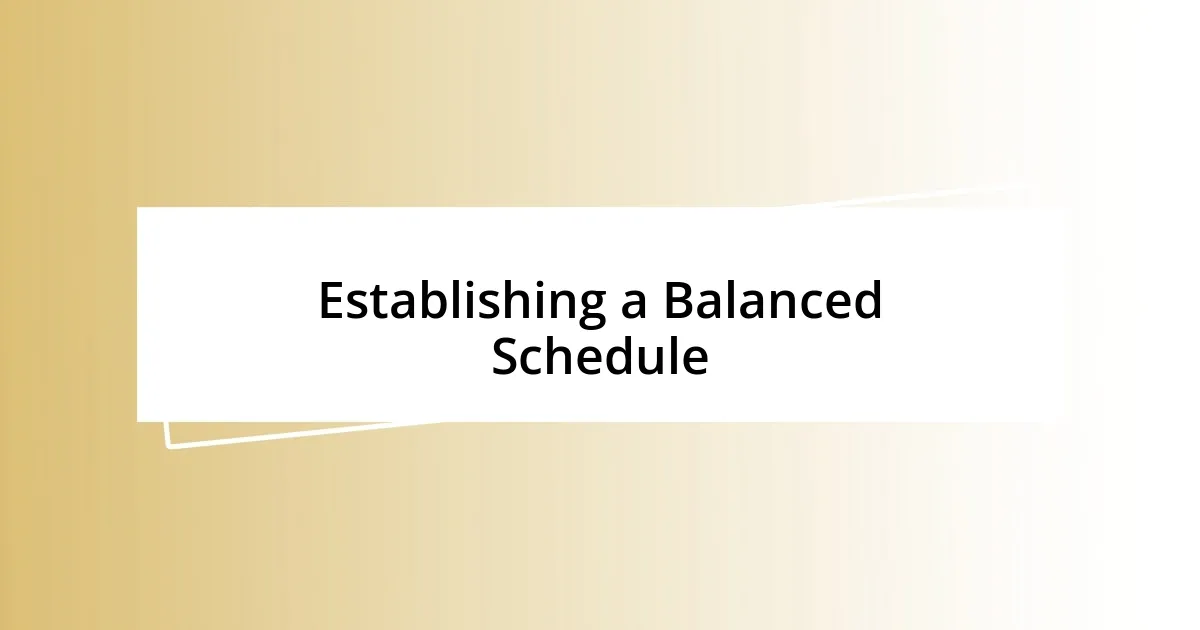
Establishing a Balanced Schedule
Establishing a balanced schedule is crucial for harmonizing personal interests with research obligations. I’ve learned the hard way that setting clear priorities each week transforms a chaotic calendar into a manageable plan. It’s like crafting a recipe—just the right ingredients in the right amounts can yield a satisfying dish. Are you stocking your calendar with a balance of activities that nourish your passions and meet your research deadlines?
I find that breaking my day into time blocks dedicated to specific tasks helps immensely. For instance, mornings might be for deep research writing, while afternoons can be reserved for personal projects or hobbies. I’ve noticed that this structure reduces overwhelm and enhances my creativity. How do you structure your days to maximize both productivity and enjoyment?
Some days, I allow flexibility in my schedule, giving myself permission to pivot if inspiration strikes. Just last week, I spontaneously delved into a new personal interest, exploring the art of urban sketching. The joy it brought invigorated my research later, as I found new perspectives to weave into my academic work. Have you experienced a moment where your personal interests unexpectedly enriched your research?
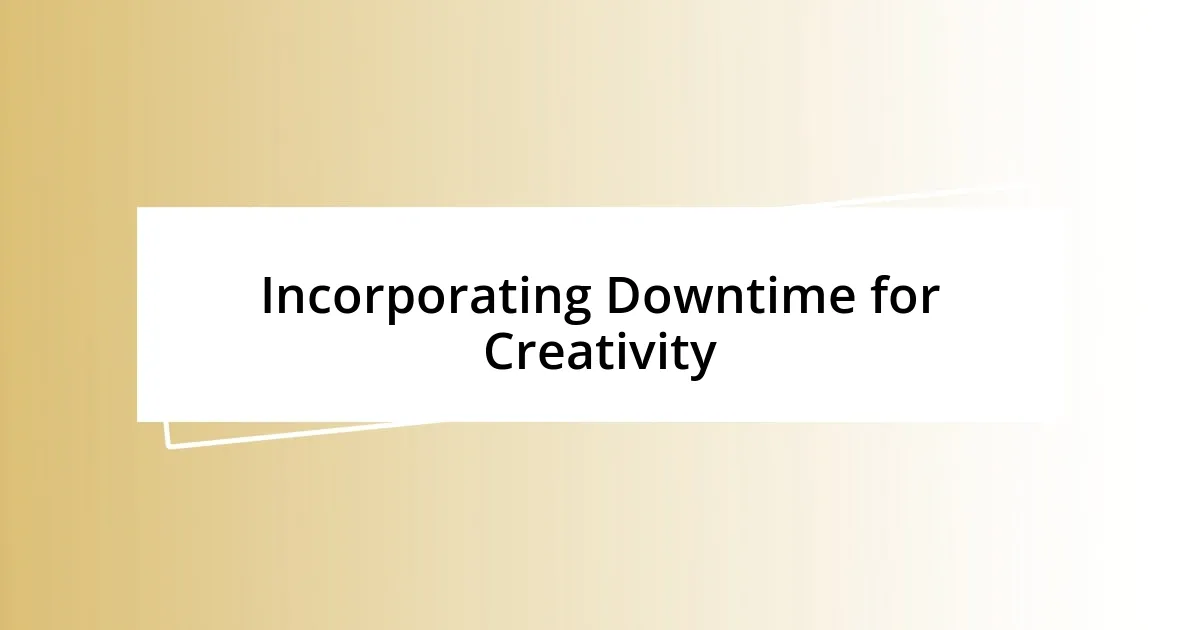
Incorporating Downtime for Creativity
Incorporating downtime for creativity is something I’ve come to cherish in my journey. I still remember those serene weekend afternoons when I’d simply sit outside, sketching the world around me. It might seem trivial, but those moments of calm allowed my mind to wander—unexpected ideas for research often bubbled up from that relaxed state. Have you ever stumbled upon a brilliant concept when your mind was free from strict focus?
I saw that taking time to breathe also served as a refreshing reset for my creativity. There were days I felt drained from constant research demands, and stepping away for a brief hike or a leisurely read made a significant difference. During these breaks, my thoughts would align and new connections would form—like piecing together a puzzle. Isn’t it amazing how our brains work best when they’re given room to roam?
I firmly believe that embracing downtime isn’t just about stepping back—it’s about nurturing one’s creative spirit. Every so often, I indulge in a passionate hobby, like photography, which ignites a fresh wave of inspiration. Interestingly, the images I capture often influence my research perspective, illustrating how creativity fosters greater understanding. What hobbies do you turn to when you need to reignite your passion for your work?
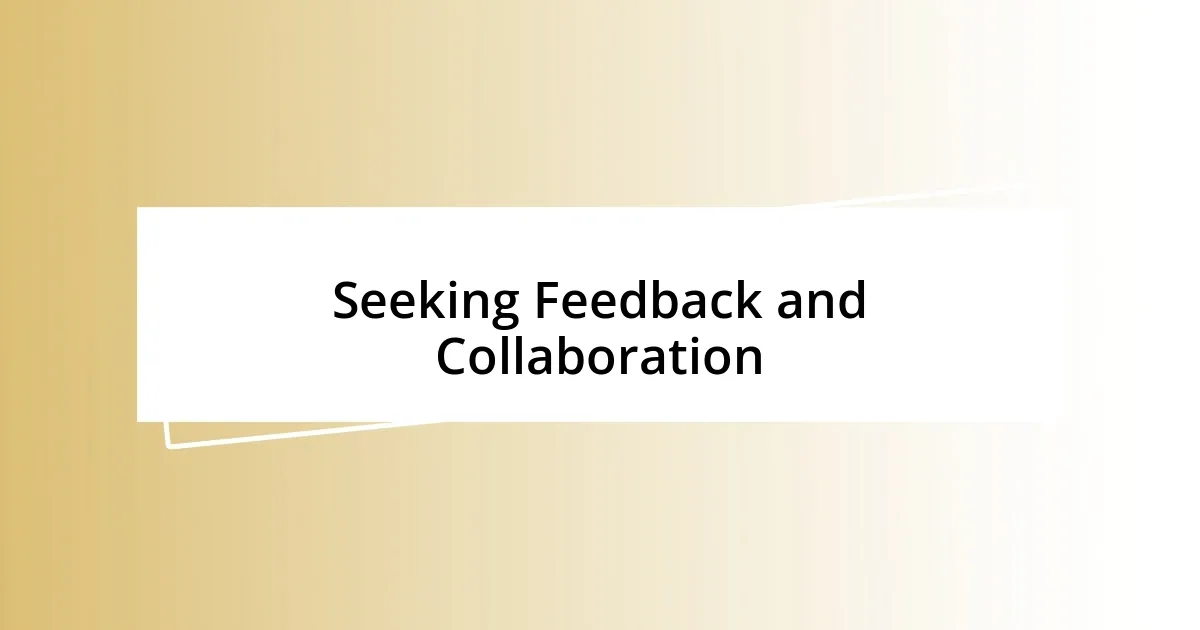
Seeking Feedback and Collaboration
Seeking feedback and collaboration is an incredibly valuable aspect of merging personal interests with research. I remember a time when I presented my findings on a project to a small group of colleagues. Their insights not only refined my approach but also opened my eyes to new angles I hadn’t considered before. Have you ever had a conversation that shifted your perspective entirely?
Engaging with others can often lead to unexpected creativity. Recently, I teamed up with a friend who shares a similar interest in environmental issues. While brainstorming, we discovered a cross-over between our research themes, which sparked an exciting joint project. How has a collaboration transformed an idea you were passionate about?
It’s essential to create a network of supportive individuals who understand the balance you’re trying to achieve. I sometimes post updates on my research journey on social media, inviting input from both peers and mentors. The feedback I receive is often a blend of encouragement and constructive criticism, pushing me to think outside my individual framework. Does your community provide the support you need to blend your passions and professional goals?
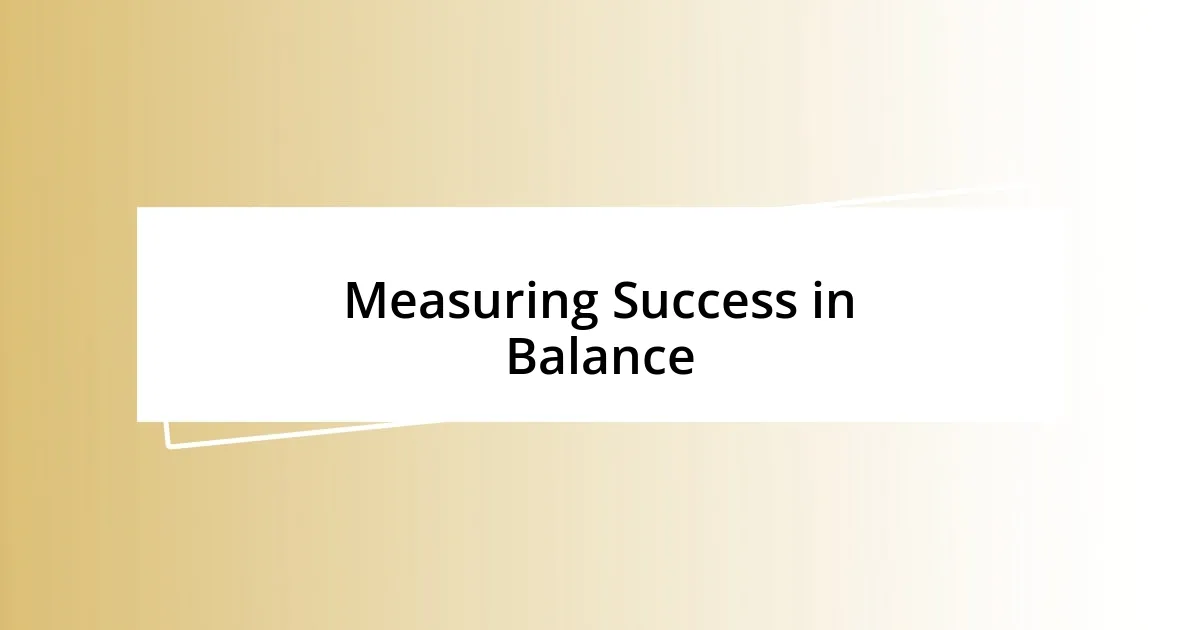
Measuring Success in Balance
Measuring success in finding a balance can feel nuanced. For me, success isn’t just about the outcomes of my research; it’s also about the sense of fulfillment I derive from my personal interests. I remember one evening, after a long day of studying, when I picked up my guitar and felt an overwhelming sense of satisfaction washing over me. In those moments, I realized that these personal passions contribute to my overall sense of achievement. Have you experienced that sense of joy when engaging in something you love, even on a busy day?
In my journey, I’ve learned to measure balance through my emotional well-being. When I’m deeply invested in research but neglecting my hobbies, I start to feel overwhelmed and drained. I recall a specific project that had me engrossed for weeks; I was productive, but the spark in my creativity dimmed. On a whim, I decided to spend a weekend gardening—something I hadn’t prioritized in a while. The act of nurturing those plants rejuvenated my spirit, allowing me to return to my research with a fresh perspective. How do you recognize when you’re tipping the scales too far toward one side?
Setting tangible goals has been instrumental in assessing my balance. I often jot down what I’d like to accomplish in both my personal interests and research pursuits. A couple of months ago, I set a goal to dedicate a few hours each week to painting alongside working on my studies. By tracking my progress in both areas, I could see how they complemented one another, creating a richer tapestry of ideas. Doesn’t it feel rewarding to achieve milestones in both your passions and your professional endeavors?









